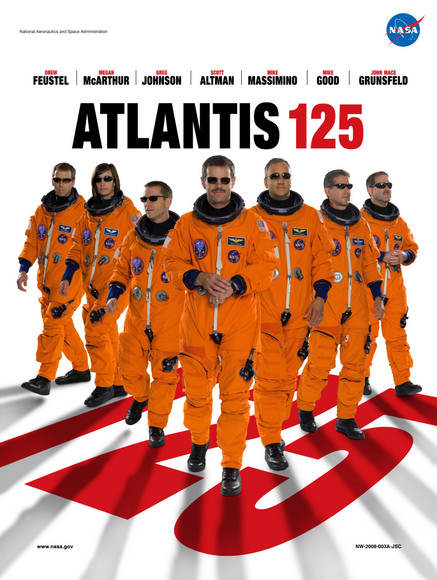[/caption]
Personally, I think this move is just in response to the Onion's most recent dig at NASA (
"NASA Embarks on Epic Delay"
) but mission managers for the upcoming Hubble repair mission are considering moving the launch of space shuttle Atlantis up one day to May 11. This would allow an extra day for launch attempts. May 12 had been the target day, but deputy program manager LeRoy Cain told reporters at a press conference on Thursday that the shuttle will likely be ready a day earlier, which would give Atlantis and extra day for a launch attempt before having to stand down for a week to allow the military to proceed with a previously scheduled launch at the Eastern Test Range. A decision about whether Atlantis will be ready to fly on the 11th will come next week Thursday (April 30) following a mission management review. But an accident at the launch pad that dinged one of Atlantis' payload bay doors might hinder moving the launch up a day, and engineers are assessing if a repair is necessary.
[caption id="attachment_29890" align="aligncenter" width="226" caption="A socket wrench at the launch pad. Credit: NASASpaceflight.com"]
[/caption] A one-and-one-eighth-inch socket from a torque wrench fell from a service platform and hit Atlantis' left payload bay door radiator while cargo for the Hubble repair mission was being installed. None of the cargo for the mission was damaged. Engineers will decide if any repairs are needed.
But moving the launch up a day may be a first for NASA.
"We prefer to have three launch attempts days available and the team is off evaluating May 11," Cain said. "It looks very good, but it will be constrained by the work that needs to be done with the cargo elements. We'll set the official launch date next week
If any delays occur (weather, technical, etc) that Atlantis can't get off the pad by May 13, the next opportunity to launch wouldn't be until May 22. NASA, the military and commercial operators share tracking, safety and other support services at Cape Canaveral Air Force Station. Usually, it takes at least two days to configure the range for supporting different types of rockets.
[caption id="attachment_29889" align="aligncenter" width="580" caption="Members of the STS-125 crew at a press briefing. Credit: NASA"]
[/caption] At a later press briefing yesterday, the crew of the STS-125 mission to Hubble said they are looking forward to the mission. "We are ready for this mission, we are trained and looking forward to executing everything we've been preparing for," said the commander Scott Altman.
The other "big" news revealed (perhaps another first) during the crew press conference is that Mike Massimino, who has been Twittering during the training for the mission, (
@Astro_Mike
) will attempt to Twitter from space. Massimino said he wasn't yet sure how the team would work out the technical issues, as space missions don't usually have streaming internet.
"We're going to be really busy so I'm not sure how much we'll do this from orbit," he said. "I'll try to do it when I have free time in between missions. I can't make any promises, but I'm going to try."
 Universe Today
Universe Today
